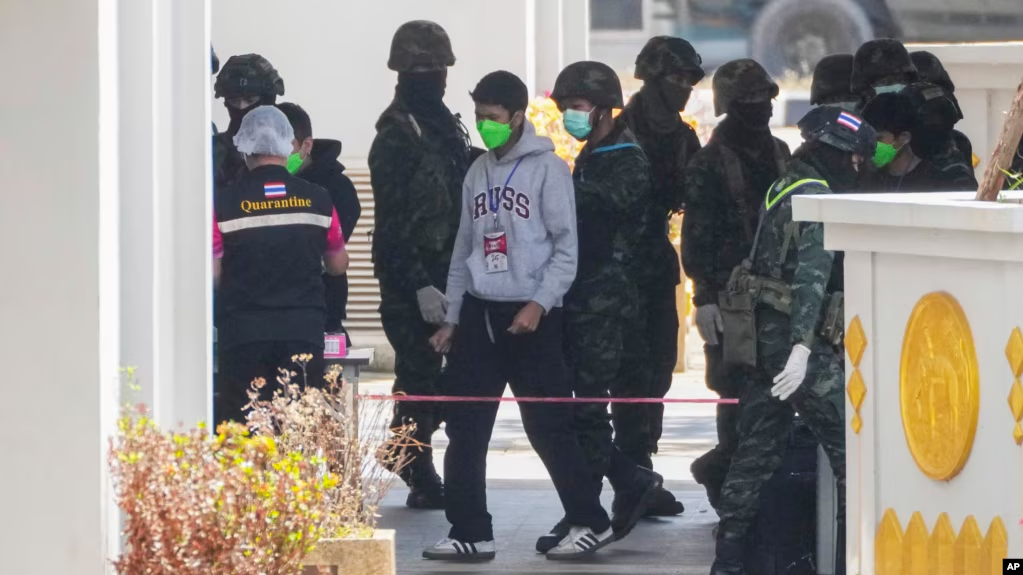
Thai police detained 100 people suspected of being involved in operating a cyber fraud center in Cambodia on Wednesday ( March 5 ) . This is the first time that Thailand has arrested Thai nationals in the fight against transnational cyber fraud.
Reuters reported that Royal Thai Police Chief Thatchai Pitaneelaboot said arrest warrants had also been issued for two Chinese nationals who were allegedly " gang leaders . " Last month , Thai and Cambodian police raided a fraud center in the border town of Poipet, where authorities took more than 215 people away . In February , Myanmar sent the first batch of 260 people taken from several scam centers to Thailand . So far, about 7,000 people from more than 20 countries have been rescued, the vast majority of them Chinese, and some are trying to return home. victims of human trafficking and Bangkok is coordinating their repatriation. the 100 people arrested on Wednesday were part of a criminal gang operating a cyber fraud center . Chief Inspector General Thachai said they deceived victims by posing as government officials. He estimated that more than 1,000 Thais were still working in cross-border fraud centers. " These scam centres are transnational criminal organisations run by foreigners working together with Thais to defraud Thais, " he said. Thai police have said that since March 2022 , in Thailand alone, victims of telecommunications fraud have suffered economic losses of 80 billion baht, or about US$ 2.4 billion. May 2024 report by the United States Institute of Peace, a Washington think tank , pointed out that online fraud targets millions of victims around the world and generates $ 64 billion in illegal income each year. Minister Paetongtarn Shinawatra on March 3 ordered a study into the effectiveness of building a border wall along parts of the border with Cambodia to prevent illegal crossings and other illegal activities . The border between Thailand and Cambodia is 817 kilometers long. The Thai Ministry of Defense had previously proposed building a wall to seal off the 55- kilometer natural border crossing between Thailand's Sa Kaeo province and Poipet , which is currently protected only by barbed wire. Currently, the relevant countries are expanding the scope of the crackdown on these telecom fraud centers, which use the Internet to contact potential victims and conduct large-scale global financial fraud from Southeast Asia, especially those located in Thailand's porous border areas with Myanmar and Cambodia . According to the United Nations, hundreds of thousands of people have been trafficked to these fraud centers by criminal gangs in recent years. At least 120,000 people in Myanmar and another 100,000 in Cambodia may have been forced into lucrative online fraud. Many were lured by False promises of high-paying jobs.
These telecom fraud centers have been operating in the region for many years. However, the incident in which Chinese actor Wang Xing was lured to Thailand in early January under the pretext of a filming job and then trafficked to a Myanmar telecom fraud park caused a public outcry on social media, prompting the Chinese embassy and consulate in Thailand and the Thai police to intervene in the investigation. Wang Xing was subsequently rescued and returned to China.
The Wang Xing case also sparked a rare grassroots movement in China, collecting nearly 1,800 names of Chinese people who were allegedly forced to work in Myanmar 's online fraud centers. Since then, pressure from public opinion has forced China and Southeast Asian countries to step up efforts to crack down on fraud centers, including Thailand cutting off electricity, fuel and the Internet in areas related to fraud centers.
The telecommunications fraud centers on the Myanmar-Thailand border have dealt a heavy blow to the reputation of China, Thailand and Myanmar, especially Thailand's tourism industry, prompting the authorities of the three countries to join forces in recent weeks to crack down on telecommunications fraud centers and illegal network activities in the Thai-Myanmar border area .
